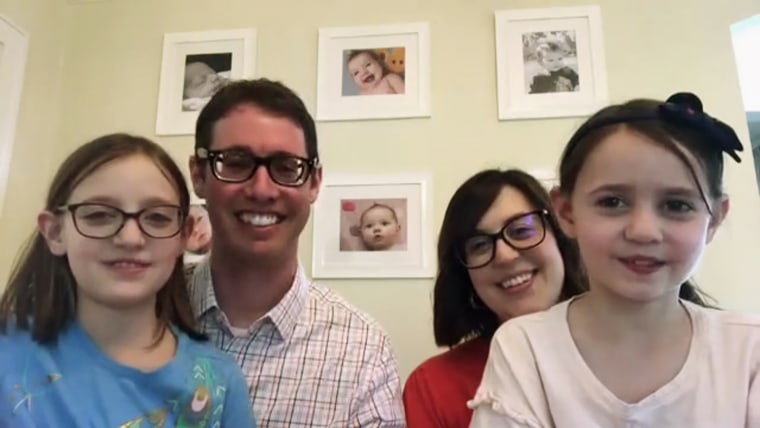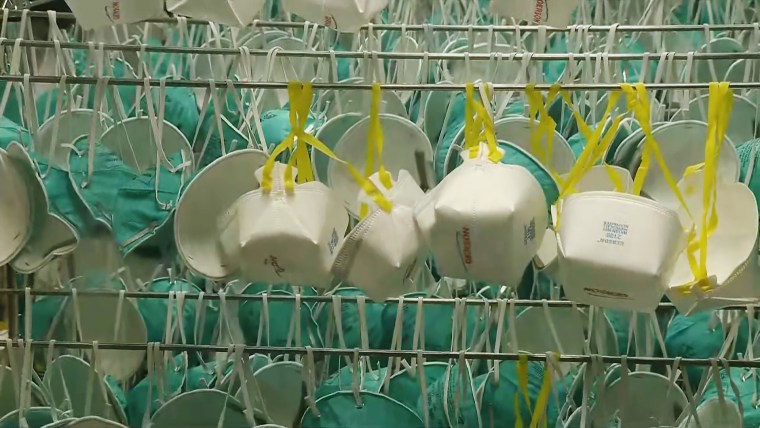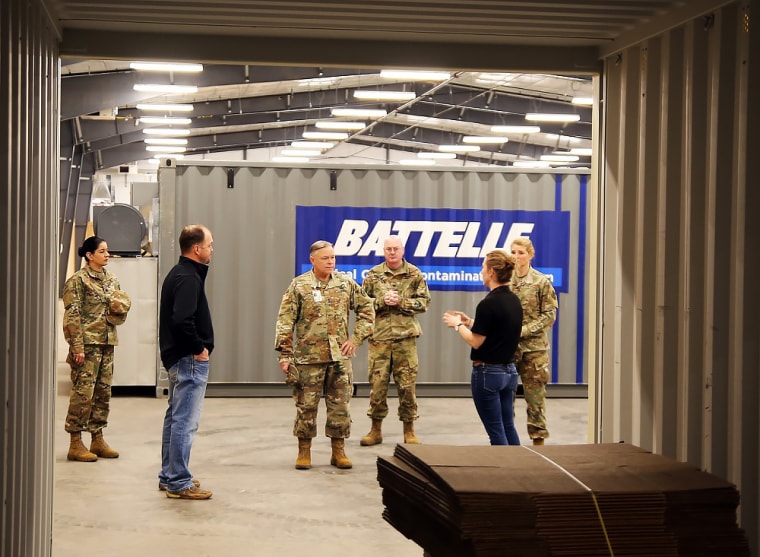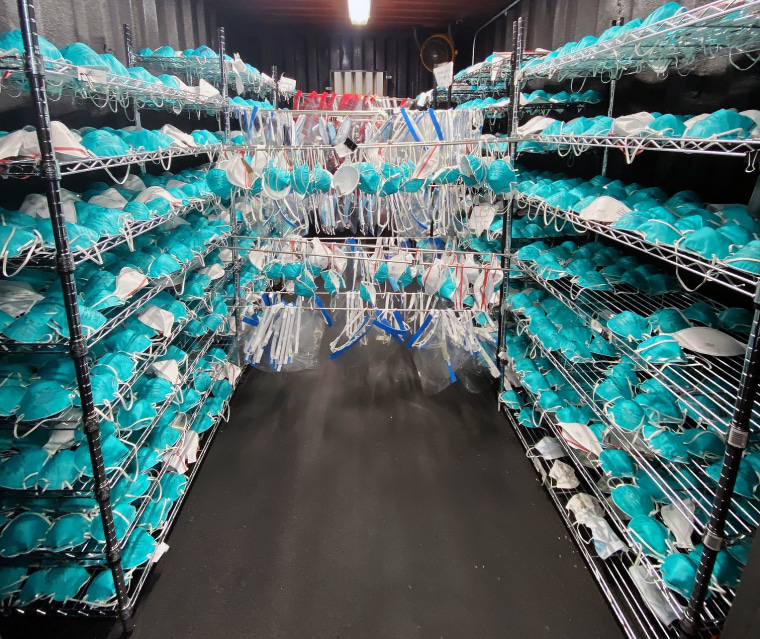Late Monday, the Pentagon announced a $415 million contract to commission 60 decontamination systems that will allow millions of highly protective N95 face masks to be reused.
The system, which can process up to 80,000 masks per day, has been called a potential "game changer" for the front-line health care workers and first responders who rely on the masks, according to hospital officials concerned about a shortage of protective equipment to shield their staff from COVID-19.
But the story of how this system came to be is a testament to what can happen when a doctor and an engineer — who happen to be husband and wife — ask, "What if?"
A month ago, Laurie and Kevin Hommema had just finished dinner with their daughters, Emmy, 9, and Clara, 7, at their home in Columbus, Ohio. Laurie, a family physician who oversees well-being for the OhioHealth hospital network, had just come from a meeting at her hospital's Incident Command Center. She said she was worried about the dwindling supply of N95 masks and told her husband that she wouldn't have a mask when the coronavirus surge hit.
That's when Kevin, an engineer at Battelle Memorial Institute, a nonprofit research organization, offered up a simple solution, "Why don't you just clean them up and reuse them?"
Laurie said, "You can't do that?" In normal circumstances, N95 masks are thrown out after a single use.
But Kevin remembered a study his colleagues at Battelle had conducted five years earlier showing the masks could be decontaminated and reused in an emergency.
"It seemed like a slam dunk to me," Kevin said.
In the past Battelle has been awarded several government contracts and consulted the U.S. military on issues like chemical and biological hazards.
"We use this technology to decontaminate materials and surfaces and equipment all the time to rid them of dangerous pathogens," Kevin told NBC News.

Kevin and Laurie said they immediately got to work. Within minutes, Kevin emailed his colleagues to track down the research. Laurie emailed her boss at OhioHealth to ask if she could pursue this, saying "I think this could really be something to help us."
The couple then spent the evening drawing schematics, sketching out what a unit might look like. And by Sunday — only three days later — executives from OhioHealth and scientists from Battelle met to talk about the project.
From there, everything happened at warp speed, said Justin Sanchez, a life sciences research fellow at Battelle who was involved in the implementation of the system.
"This is the all hands on deck," he told NBC News. "To be quite honest, we've been working day and night."
Within five days, OhioHealth had sent a shipment of contaminated masks to Battelle to test the technology. Fast forward to March 29, when the Food and Drug Administration granted Battelle emergency authorization to deploy the machines to sites around the country. It was 15 days from the conversation at the Hommemas' house to the greenlight from the FDA.
Here's how the decontamination system works: The masks are steeped in concentrated hydrogen peroxide vapor inside a chamber — in this case a repurposed cargo-shipping container — for about two and a half hours. It takes a couple more hours to clear the chamber of any residual gas. With Battelle running the cycle 24/7, each system can process up to 80,000 N95 makes per day. According to Battelle, the masks can go through the system 20 times without degrading.

The first site to use the machine was OhioHealth, the 12 hospital system where Laurie works.
"The more we thought about it, the more ingenious it seemed," said Dr. Simi Bhullar, a critical care doctor and medical director at OhioHealth Riverside Methodist Hospital.
"The best part about it is it allows us to continue with the work as if nothing has changed," Bhullar told NBC News. "We're not stressed about, 'Gosh, how many masks are left?' And it really allows us to focus back on what we need to be focused on, which is patient care and how do we best manage the patients of the pandemic."
After the Ohio launch, one of Battelle's CCDS Critical Care Decontamination Systems made its way to Long Island, New York, another to Seattle, and over the weekend, another was unveiled in the Boston area outside an old Kmart. Health-care workers can send over their masks to be decontaminated.
"Two Sundays ago, we were on a conference call early in the morning and we heard that Battelle had this system," said Chris Coburn, chief innovation officer of Partners HealthCare, a multi-hospital system in Massachusetts. "We reached out to Battelle. Two days later we had a deal."
"This really is an extraordinary opportunity to continue to protect our health-care workforce," said Dr. Paul Biddinger, chief of emergency preparedness at Massachusetts General Hospital. "For so many weeks and now months, you heard me say that we cannot buy enough of the personal protective equipment that we would like and it's just not there for purchase."
"To have an opportunity to provide more N95s to our health care workforce is absolutely essential," he said.
On Friday, Battelle announced a new contract with the Defense Logistics Agency, making its decontamination services for N95 respirator masks free of charge to health care providers. The next sites will be in Brooklyn, New York; Chicago; and the Washington, D.C. region.

The Pentagon confirmed its contract on Monday, saying Battelle would receive $415 million for 60 systems. According to the press release, the units will be available by early May, with "prioritization and distribution by FEMA and HHS." The Defense Department said the full delivery will allow 4.8 million masks to be sterilized per day.
While the current system is only authorized to decontaminate N95 respirators, Sanchez says the technology has the potential to be used on other medical equipment like gowns and face shields.
"The speed and the pace of the pandemic is extremely fast right now," Sanchez said. "The need for doing decontamination is going to extend well beyond we get to the peak of the number of cases that are ultimately out there."
But the decontamination system isn't without drawbacks. In a memo to health care providers, Battelle says potential risks for using decontaminated respirators include reduced breathability, strap failure and a lack of filtration.
The Centers for Disease Control and Prevention says it "[does] not recommend" decontaminating and reusing respirators, saying it should "only be practiced as a crisis capacity strategy."
"This practice would be inconsistent with their approved use, but we understand in times of crisis, this option may need to be considered when FFR [filtering facepiece respirators] shortages exist," the agency wrote in a fact-sheet about the practice.
Along with hydrogen peroxide, the CDC has acknowledged that other methods of decontamination, such as ultraviolet germicidal irradiation and moist heat treatment, are the "most promising decontamination methods" but should only be "used for limited times."
On Sunday, the FDA issued an Emergency Use Authorization to Advanced Sterilization Products, a company based in California, for its STERRAD Sterilization Cycles systems. According to the company's fact sheet to health care providers, N95 respirators are sterilized using vaporized hydrogen peroxide but can only undergo the process two times.
In a news release announcing the authorization, the FDA said the systems have the potential to decontaminate about 4 million "N95 or N95-equivalent respirators per day."
Risks aside, health care providers on the front lines of the pandemic say innovations like Battelle's have helped ease concerns about PPE shortages.
"It's like Christmas!" was the subject line of an email Laurie Hommema received from a nurse.
"I walked into the [Intensive Care Unit] break room the other day and discovered about 20 paper bags full of N95 masks. It felt like Christmas morning!" the nurse wrote. "I have been having a hard time sleeping lately due to being so worried about having enough PPE to care for my patients … You have saved so many lives with your actions! WE all stand together and thank you with our whole hearts!"
But Laurie and Kevin said the scope of their contributions have yet to finally sink in.
"It's hard for us to feel like we deserve any credit," said Laurie. "It's overwhelming to think that it started with an after-dinner conversation, drawing it out on a piece of paper and seeing if it was feasible."


